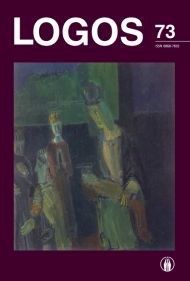XIII A. Scholastinis Diskursas „De Aeternitate Mundi“: Boecijaus Dakiečio Racionalizmas
Scholastic Dicourse „De Aeternitate Mundi“ in the 13th Century: Rationalism of Boethius of Dacia
Author(s): Dalia Marija StančienėSubject(s): History of Philosophy, Metaphysics, Epistemology, Philosophy of Religion, 13th to 14th Centuries
Published by: Visuomeninė organizacija »LOGOS«
Keywords: Boethius of Dacia; eternity of the world; augustinism; aristotelianism; averroism;
Summary/Abstract: The article analyzes the critical scholastic discourse concerning fundamental questions on metaphysics and Weltanschauung. In the 13th century, the discourse was focused on the concept of creation as methodological basis for philosophical and theological conceptions. In 1270, the Bishop of Paris Etienne Tempier issued the condemnation of thirteen heretical theses forbidding their propagation. The condemnation strengthened positions of Augustinism in philosophy and theology. One of the authors of the condemnation was Franciscan friar John Peckham who was convinced that Augustinism and Aristotelianism are incompatible. He attacked the metaphysics of Thomas Aquinas accusing him of accepting the Averroist teaching on the unity of forms. The condemnation enkindled the confrontation between Franciscans and Dominicans in considering and evaluating Greek and Arab philosophical heritage. Franciscans regarded as erroneous the attempts of Dominicans to Christianize Aristotle’s teaching. Boethius of Dacia published the treatise De Aeternitate Mundi in which he tired to prove that there is no contradiction between philosophy and religion. By doing this he tried to rehabilitate the members of Art faculty accused of the distortion of Christian teaching. The controversy concerning the eternity of the world exposed the noetic influence of Neo-Platonic Peripatetism on the elaboration of theological and philosophical concepts of creationism.
Journal: LOGOS - A Journal of Religion, Philosophy, Comparative Cultural Studies and Art
- Issue Year: 2012
- Issue No: 73
- Page Range: 75-86
- Page Count: 12
- Language: Lithuanian

